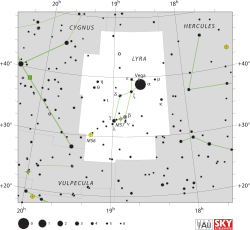Kepler-25 – Wikipedia
| Kepler-25 | |
 | |
| Observationsdata Epok: J2000.0 | |
|---|---|
| Stjärnbild | Lyran[1] |
| Rektascension | 19t 06m 33,2143s[2] |
| Deklination | +39° 29′ 16,358 ″[2] |
| Skenbar magnitud () | 10,623 ± 0,053[3] |
| Stjärntyp | |
| Spektraltyp | F V[4] |
| Variabeltyp | Planetpassage-variabel |
| Astrometri | |
| Radialhastighet () | -8,557 ± 0,0033[5] km/s |
| Egenrörelse (µ) | RA: -0,455 ± 0,040[2] mas/år Dek.: +6,169 ± 0,044[2] mas/år |
| Parallax () | 4,0822 ± 0,0236[2] |
| Avstånd | 799 ± 5 lå (245 ± 1 pc) |
| Detaljer | |
| Massa | 1,159 +0,040−0,051[6] M☉ |
| Radie | 1,297 ± 0,015[6] R☉ |
| Luminositet | 2,406 +0,126−0,128[6] L☉ |
| Temperatur | 6 270 ± 79[7] K |
| Metallicitet | -0,05 ± 0,10[7] |
| Vinkelhastighet | 9,5[8] km/s |
| Ålder | 3,45 +0,81−0,72 [6] miljarder år |
| Andra beteckningar | |
| KOI-244, TYC 3124-1264-1, AP J19063321+3929164, GSC 03124-01264, KIC 4349452, 2MASS J19063321+3929164, SDSS J190633.22+392916.5, UCAC2 45530915, UCAC3 259-146407, UCAC4 648-066811, USNO-B1.0 1294-00318425, Gaia DR3 2100451630105041152, Gaia DR2 2100451630105041152, Gaia DR1 2100451625808756608[5][9] | |
Kepler-25 eller KOI-244, är en ensam stjärna belägen i den mellersta delen av stjärnbilden Lyran. Den har en skenbar magnitud av ca 10,62[3] och kräver ett teleskop för att kunna observeras. Baserat på parallax enligt Gaia Data Release 2 på ca 4,08 mas,[2] beräknas den befinna sig på ett avstånd på ca 800 ljusår (ca 245 parsek) från solen. Den rör sig närmare solen med en heliocentrisk radialhastighet på ca -9 km/s.[5]
Egenskaper
[redigera | redigera wikitext]Kepler-25 är en gul till vit stjärna i huvudserien av spektralklass F V.[4] Den har en massa som är ca 1,16[6] solmassa, en radie som är ca 1,3[6] solradie och utsänder energi från dess fotosfär motsvarande ca 2,4 gånger solen[6] vid en effektiv temperatur av ca 6 300 K.[6]
Planetsystem
[redigera | redigera wikitext]År 2011 upptäckte Keplerteleskopet två kandidatplaneter som passerade framför stjärnan.[10] Dessa planeter har mycket snäv bana men ligger ändå i 1:2 omloppsresonansen till varandra, vilket tyder på frånvaron av andra planetariska objekt i den inre delen av planetsystemen.[11] Dessa exoplaneter bekräftades genom metoden för mätning av variation i transittid.[12] En tredje exoplanet upptäcktes genom uppföljande mätningar av radiell hastighet och bekräftades i januari 2014.[8]
Planeternas omloppsbanor är väl samordnade med stjärnans ekvatorialplan, med en avvikelse av 7 ± 8°.[13]
(AE) | (d) | |||||
|---|---|---|---|---|---|---|
| b | 8,7 +2,5−3,6 M🜨 | 0,068 | 6,238297 ± 0,000017 | 0,029 ± 0,0017 | 92,827 +0,084−0,083 | 2,748 ± 0,035 R🜨 |
| c | 15,2 ± 1,3 M🜨 | 0,11 | 12,7207 ± 0,0001 | 0,0061 + 0,0049−0,0041 | 92,764 +0,042−0,039 | 5,217 ± 0,065 R🜨 |
| d | 71,9 ± 9,8 M🜨 | - | 122,4 +0,0−0,07 | 0,13 +0,13−0,09 | - | - |
Se även
[redigera | redigera wikitext]Referenser
[redigera | redigera wikitext]- Den här artikeln är helt eller delvis baserad på material från engelskspråkiga Wikipedia, Kepler-25, 14 maj 2023..
Noter
[redigera | redigera wikitext]- ^ Roman, Nancy G. (1987). "Identification of a Constellation From a Position". Publications of the Astronomical Society of the Pacific. 99 (617): 695–699. Bibcode:1987PASP...99..695R. doi:10.1086/132034. Vizier query form
- ^ [a b c d e f] Brown, A. G. A.; et al. (Gaia collaboration) (August 2018). "Gaia Data Release 2: Summary of the contents and survey properties". Astronomy & Astrophysics. 616. A1. arXiv:1804.09365. Bibcode:2018A&A...616A...1G. doi:10.1051/0004-6361/201833051. Gaia DR2 record for this source at VizieR.
- ^ [a b] Henden, A. A.; et al. (2016). "VizieR Online Data Catalog: AAVSO Photometric All Sky Survey (APASS) DR9 (Henden+, 2016)". VizieR On-line Data Catalog: II/336. Originally Published in: 2015AAS...22533616H. 2336. Bibcode:2016yCat.2336....0H. Vizier catalog entry
- ^ [a b c] Schneider, Jean, "Star: Kepler-25", Extrasolar Planets Encyclopaedia, Paris Observatory, archived from the original on 2012-06-16, hämtad 2013-12-18
- ^ [a b c] Kepler-25 (unistra.fr). Hämtad 2023-07-30.
- ^ [a b c d e f g h] Silva Aguirre, V.; et al. (2015). "Ages and fundamental properties of Kepler exoplanet host stars from asteroseismology". Monthly Notices of the Royal Astronomical Society. 452 (2): 2127–2148. arXiv:1504.07992. Bibcode:2015MNRAS.452.2127S. doi:10.1093/mnras/stv1388.
- ^ [a b] Huber, Daniel; et al. (2013). "Fundamental Properties of Kepler Planet-candidate Host Stars using Asteroseismology". The Astrophysical Journal. 767 (2). 127. arXiv:1302.2624. Bibcode:2013ApJ...767..127H. doi:10.1088/0004-637X/767/2/127.
- ^ [a b] Marcy, Geoffrey W.; et al. (2014). "Masses, Radii, and Orbits of Small Kepler Planets: The Transition from Gaseous to Rocky Planets". The Astrophysical Journal Supplement Series. 210 (2). 20. arXiv:1401.4195. Bibcode:2014ApJS..210...20M. doi:10.1088/0067-0049/210/2/20.
- ^ "Kepler-25". SIMBAD. Centre de données astronomiques de Strasbourg. Hämtad 2019-10-02.
- ^ Borucki, William J.; et al. (2011). "Characteristics of Planetary Candidates Observed by Kepler. II. Analysis of the First Four Months of Data". The Astrophysical Journal. 736 (1). 19. arXiv:1102.0541. Bibcode:2011ApJ...736...19B. doi:10.1088/0004-637X/736/1/19.
- ^ Migaszewski, Cezary; Gozdziewski, Krzysztof (2018), "A periodic configuration of the Kepler-25 planetary system?", Monthly Notices of the Royal Astronomical Society, 480 (2): 1767–1777, arXiv:1803.10285, doi:10.1093/mnras/sty1972, S2CID 55395774
- ^ Steffen, Jason H.; et al. (2012). "Transit timing observations from Kepler - III. Confirmation of four multiple planet systems by a Fourier-domain study of anticorrelated transit timing variations". Monthly Notices of the Royal Astronomical Society. 421 (3): 2342–2354. arXiv:1201.5412. Bibcode:2012MNRAS.421.2342S. doi:10.1111/j.1365-2966.2012.20467.x.
- ^ Albrecht, Simon; Winn, Joshua N.; Marcy, Geoffrey W.; Howard, Andrew W.; Isaacson, Howard; Johnson, John A. (2013), "Low Stellar Obliquities in Compact Multiplanet Systems", The Astrophysical Journal, 771 (1): 11, arXiv:1302.4443, Bibcode:2013ApJ...771...11A, doi:10.1088/0004-637X/771/1/11, S2CID 17247029
- ^ Mills, Sean M.; et al. (2019). "Long-period Giant Companions to Three Compact, Multiplanet Systems". The Astronomical Journal. 157 (4). 145. arXiv:1903.07186. Bibcode:2019AJ....157..145M. doi:10.3847/1538-3881/ab0899.


 French
French Deutsch
Deutsch


